A new press release by the United Nations Environment Program (UNEP) highlighted the threat of plastic pollution in the world’s oceans.
According to the organization, 89 percent of the plastic in the ocean is single-use plastic items such as plastic bags, straws, and disposable utensils. This data was collected through more than 5,000 dives that collected 3,000 pieces of manmade debris.
Further, the pollution is now reaching deeper ocean locations than ever. UNEP stated plastic bags were found in the Marina Trench, the world’s deepest ocean trench. The region extends 10,898 meters below the surface of the water. “Finding plastic this deep in the ocean reveals the devastating link between human activity on land and the consequences from marine life below water,” UNEP noted.

The prevalence of plastic in the ocean is of increasing concern to the public and government bodies as its impact on the environment and marine life becomes more understood than ever before. UNEP pointed out that plastic can last for thousands of years on Earth and leads to the death of more than 100,000 marine animals annually.
Plastic is often found in the stomachs or necks of dead marine animals as various species, including sea turtles and whales, mistakenly ingest the trash. “This is especially concerning for oceanic ecosystems, since these ecosystems have very slow growth rates,” the press release explained. “Cleaning up our oceans is more important than ever, with more and more plastic being dumped into the ocean every day.”
“Our only hope to reverse this problem is to cut back on our plastic-use on land, lessening the amount of plastic that finds its way into the oceans,” UNEP said.

Efforts have been made to combat the issue. The UK government recently allocated £61.4 million to end plastic pollution in the world’s ocean. Prime Minister Theresa May named marine plastic pollution “one of the most significant environmental challenges facing the world today,” adding that it is “vital that we tackle this issue, so that future generations can enjoy a natural environment that is healthier than we currently find it.”
Additionally, cities across the world have enacted bans on single-use plastic items, such as straws and plastic bags. These moves have proved effective in the past; researchers uncovered a 30 percent drop in plastic in the ocean nearby areas that had implemented such bans.


